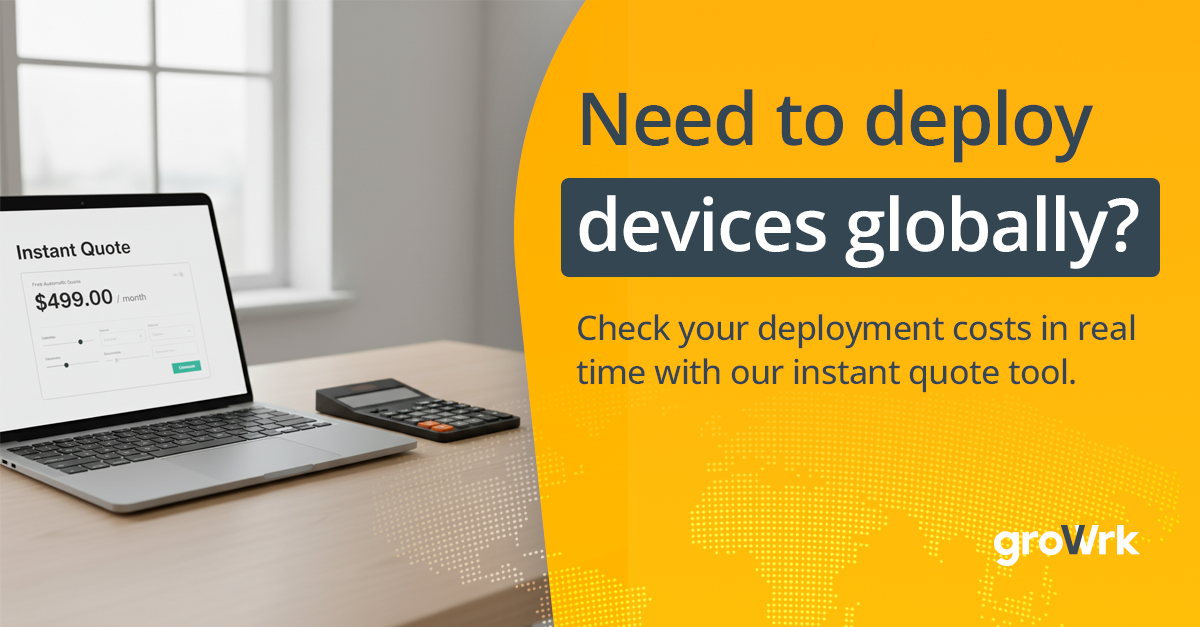How to send IT equipment to South Africa
Are you planning to send IT equipment to remote teams in South Africa? At GroWrk, we specialize in streamlining your IT asset management across borders, making it easier than ever to get your laptops, servers, or other essential devices to South Africa without stress. From handling logistics to managing customs and ensuring compliance with local regulations, we take care of it all.
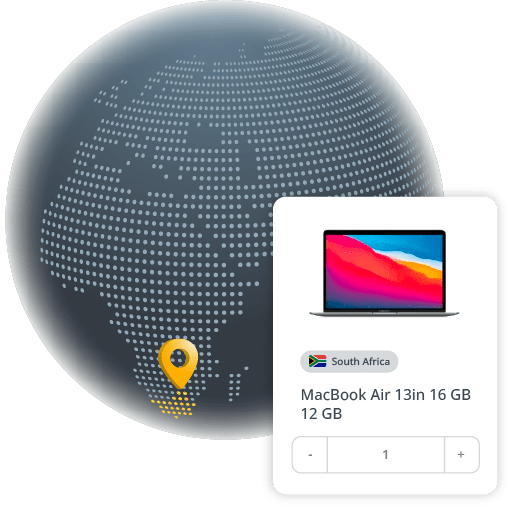
At a glance
South Africa has a rapidly evolving IT sector driven by digital transformation, cloud adoption, and a growing tech startup ecosystem. The country is a major hub for IT outsourcing and has a skilled workforce that is proficient in software development, cybersecurity, and data management.
|
CURRENCY South African Rand (ZAR) |
OFFICIAL LANGUAGE 11 official languages, including English and Afrikaans |
TIME ZONE GMT+02:00 South African Standard Time (SAST) (No daylight saving time) |
|
CUSTOMS DUTY ON ELECTRONICS 0-15% Typically 0-15% customs duties and 15% VAT |
SHIPPING LEAD TIME 5-10 days (depending on shipping method and customs clearance) |
IT OUTSOURCING MARKET Expected to grow significantly up to US$2.40bn in 2025, driven by increased demand for cloud computing and remote work solutions |
Overview of IT operations in South Africa

- Growing IT sector: South Africa’s IT industry contributes significantly to the economy, with major advancements in cloud computing, AI, and fintech. It is projected to grow from US$47.92 billion in 2025 to US$102.40 billion by 2034.
- Reliable IT infrastructure: The country has an expanding fiber network and multiple data centers supporting both local and international businesses.
- Skilled workforce: South Africa has a large pool of IT professionals, making it an attractive location for outsourcing and remote tech teams.
- Regulatory compliance: The Protection of Personal Information Act (POPIA) governs data security and privacy, impacting IT operations and cybersecurity measures.
- Evolving tech ecosystem: Cities like Cape Town and Johannesburg are home to thriving tech hubs and startup accelerators, fostering innovation and entrepreneurship.
Shipping IT equipment to South Africa: What you need to know
| Customs regulations |
South Africa follows strict customs regulations for imported goods, including IT equipment. All shipments must comply with South African Revenue Service (SARS) requirements, ensuring accurate classification, proper declarations, and payment of applicable duties and taxes.
|
| Duties and taxes |
|
| Required documentation |
|
| Import restrictions |
|
| New vs. Used equipment |
|
| Penalties or fines for non-compliance |
|
Checklist for sending laptops to South Africa
When shipping laptops to South Africa, it’s important to follow a few best practices to ensure the process goes smoothly, and your equipment arrives safely and on time. Here are some helpful shipping tips:
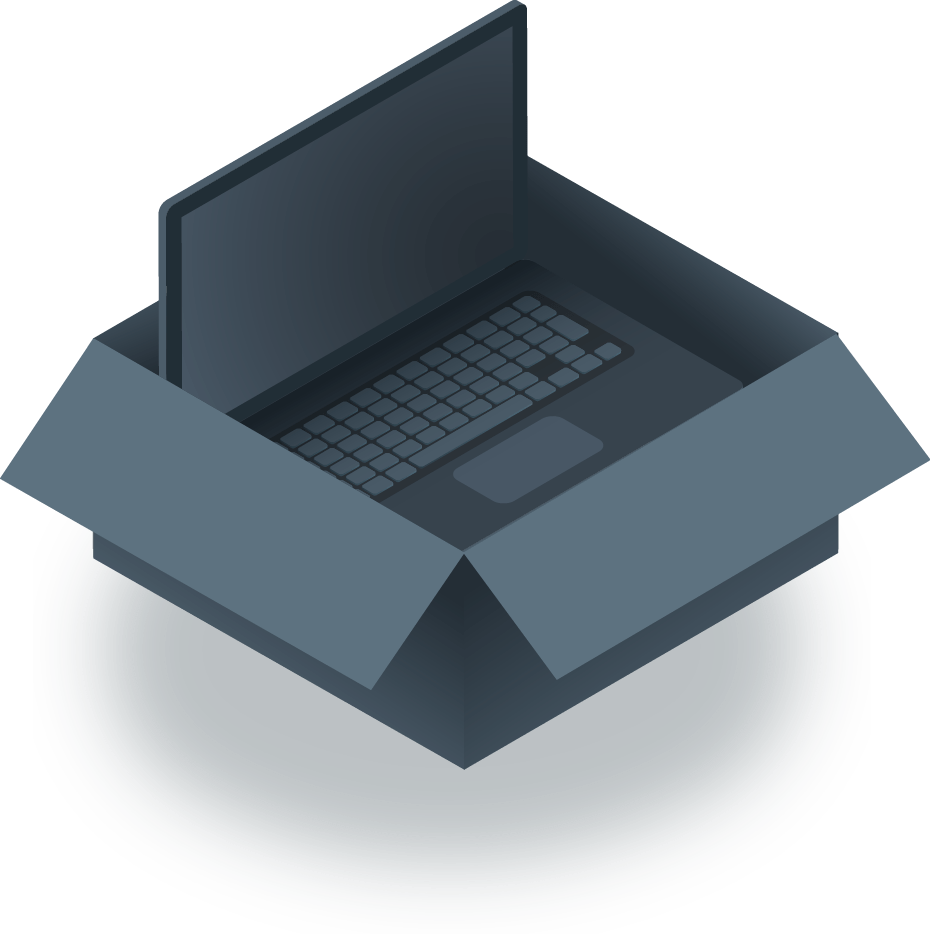
Select trusted couriers: Choose reliable couriers such as GroWrk, DHL, UPS, FedEx, or South African Post Office (SAPO) for international shipping. These carriers offer tracking services and have experience handling South African customs procedures.
Check service levels: Select the appropriate shipping option based on urgency. Express shipping (3-6 days) for high-priority deliveries. Standard shipping (7-14 days) for cost-effective options.
Use high-quality packaging: Secure laptops with sturdy, padded boxes and protective materials like bubble wrap, foam inserts, or air cushions to prevent damage during transit.
Disassemble where possible: If shipping accessories like chargers, docking stations, or monitors, package them separately to prevent damage. Remove detachable components if applicable.
Label clearly: Ensure the recipient’s name, address, and contact details are correctly labeled. Mark the package as "fragile" to encourage careful handling.
Accurate product descriptions: On the commercial invoice, provide a detailed and accurate description of the laptop, including its brand, model, and serial number. Inaccurate descriptions may cause customs delays.
Value declaration: Declare the correct value of the laptop to avoid under- or over-declaring, which could lead to customs inspections or fines. The declared value determines any applicable duties and taxes.
Customs declarations: All international shipments require customs clearance. Include: South African Customs Declaration (DA 550/DA 500), commercial invoice, and packing list
Proof of origin: If applicable, include a certificate of origin to benefit from trade agreements such as the SADC Free Trade Area, which may reduce or eliminate duties for eligible goods.
Understand import duties & taxes: Laptops are generally duty-free under South Africa’s import tariff schedule. However, they are subject to 15% VAT on the CIF value (Cost + Insurance + Freight). Additional clearance fees may apply depending on the courier and value of the shipment.
Pre-pay duties and taxes: Some couriers allow for pre-paid duties and taxes to simplify customs clearance and prevent the recipient from facing unexpected charges upon arrival.
Protect against loss or damage: Consider purchasing shipping insurance for high-value laptops to protect against loss, theft, or damage during transit.
Compliance with South African regulations: Ensure the laptop complies with Independent Communications Authority of South Africa (ICASA) regulations if it includes wireless components. For bulk imports, a permit or certification may be required.
Use tracking tools: Major couriers provide real-time tracking—monitor shipments closely to anticipate customs clearance updates and delivery progress.
Stay in touch with the recipient: Notify the recipient about the expected delivery timeline, tracking updates, and any customs-related requirements to avoid delays.
Expect weather and seasonal delays: Shipping may be affected by heavy rains, load-shedding disruptions, and peak season congestion (e.g., December holidays, Black Friday). Plan accordingly for urgent deliveries.
South African domestic delivery options: For final delivery, consider using SAPO, The Courier Guy, Fastway Couriers, or RAM Hand-to-Hand Couriers to ensure timely and secure delivery within South Africa.
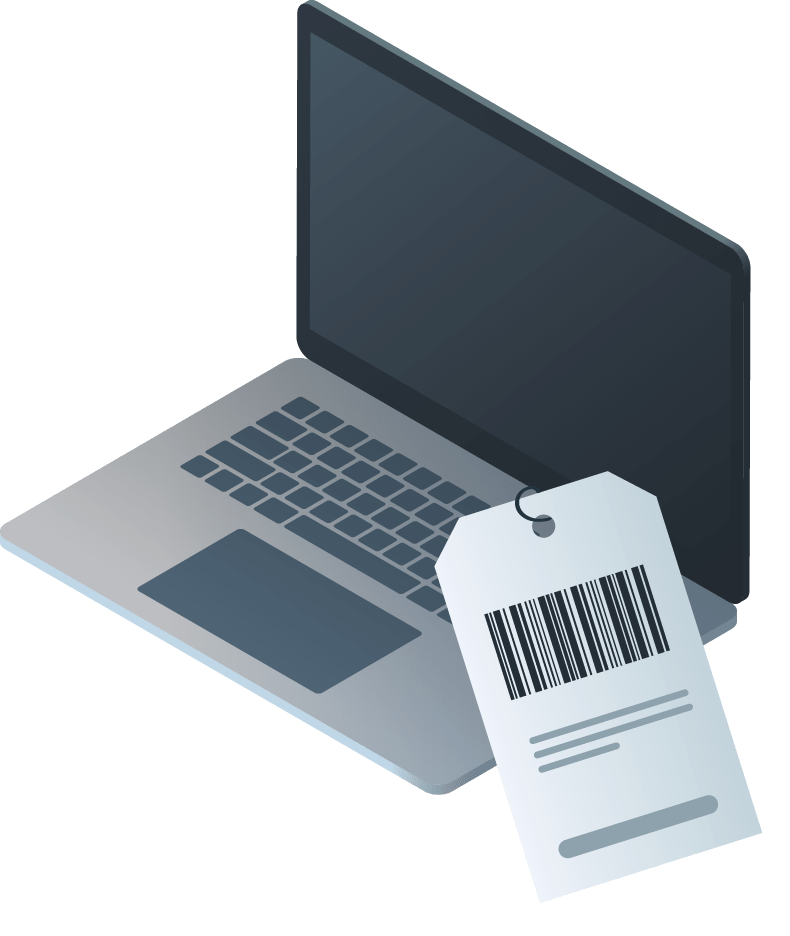
Average cost of IT Equipment in South Africa
Laptops (Business Grade):
- Mid-range: $330 – $660 USD
- High-end: $1,100 – $1,650+ USD
High-end models such as Apple MacBook Pro, Dell XPS, and Lenovo ThinkPad are priced on the higher end.
Monitors (Business Grade):
- Standard: $90 – $150 USD
- Ultrawide/4K: $270 – $330+ USD
Monitors from trusted brands like Dell, Samsung, and LG typically range within these prices, with 4K or ultrawide models costing more.
Desktops (Business Grade):
- Standard Desktop PC: $550 – $1,100 USD
- Workstation Desktop (for high-performance tasks): $1,100 – $1,650+ USD
Prices depend on the brand and specifications, with options from HP, Lenovo, and Apple among the most common.
Printers (Laser):
- Standard Office Printers: $110 – $220 USD
- High-Volume Printers: $330 – $1,650+ USD
Leading brands such as HP, Canon, and Brother offer a wide range of models for office environments.
Public holidays & IT work hours to plan your shipment
Key public holidays in South Africa:
- New Year’s Day – January 1
- Human Rights Day – March 21
- Good Friday – Friday before Easter Sunday (date varies)
- Easter Monday (Family Day) – Monday after Easter Sunday (date varies)
- Freedom Day – April 28
- Workers’ Day – May 1
- Youth Day – June 16
- National Women’s Day – August 9
- Heritage Day – September 24
- Day of Reconciliation – December 16
- Christmas Day – December 25
- Day of Goodwill (Boxing Day) – December 26
If a public holiday falls on a Sunday, the following Monday is typically observed as a public holiday.
Typical work hours for IT professionals
- Standard workweek:
- The typical workweek is 40 to 45 hours, with standard business hours from 8:00 AM to 5:00 PM, Monday to Friday.
- Many IT companies allow flexible working hours, where employees may start between 7:00 AM and 9:00 AM and finish between 4:00 PM and 6:00 PM, depending on the employer’s policies.
- Employees usually take a lunch break of 30 minutes to 1 hour.
- Overtime regulations:
- Overtime is regulated by South Africa’s Basic Conditions of Employment Act (BCEA).
- Employees may not work more than 10 hours of overtime per week.
- Overtime pay is typically 1.5 times the hourly wage on weekdays and double on Sundays and public holidays.
- Some companies offer time-off-in-lieu instead of overtime pay.
What to consider when retrieving IT equipment from employees in South Africa
| Local delivery and logistics services |
|
| Inventory management |
|
| Logistics challenges for remote locations |
| Longer delivery and retrieval times: Remote areas may experience delayed pickups and deliveries due to fewer transportation routes and limited logistics infrastructure. Retrieval might take several extra days, especially in rural or outlying regions. Higher shipping costs: Deliveries to rural locations often come with higher charges due to fuel costs, distance, and fewer shipments on those routes. Special handling fees may apply for fragile IT assets like laptops and monitors. Limited service availability: Some courier services may not operate daily in remote areas, leading to longer waiting periods for IT equipment retrieval. Weekend deliveries may not be available in certain locations. Customs and regulatory hurdles: Import and export of IT equipment with encryption software or high-tech components may require permits or clearance from authorities like SARS (South African Revenue Service). Refurbished or used equipment may need proof of purchase and compliance with electronic waste regulations. Lack of tracking updates: Shipments to remote locations may not have real-time tracking updates, making it difficult to monitor delivery progress. Delays in scanning at regional hubs may cause gaps in tracking visibility. |
| Equipment agreement with employees |
|
How to dispose of IT equipment in South Africa
E-Waste Recycling:
- Certified E-Waste handlers: Businesses must dispose of old IT equipment through registered e-waste recycling providers in line with South Africa’s National Environmental Management: Waste Act (NEMWA). These professionals safely process electronic waste, ensuring harmful components like batteries and heavy metals are handled correctly.
- Drop-off recycling centers: Individuals and businesses can take outdated IT devices to designated e-waste collection points or certified recycling facilities for responsible disposal.
Data Destruction:
- Wipe data completely: Before removing any IT equipment, use certified software to erase all stored data to prevent unauthorized access.
- Physical destruction: If the data is highly sensitive, consider shredding or degaussing hard drives and SSDs to ensure destruction.
Repurposing or Donating:
- Support education & communities: Consider donating working computers and IT devices to schools, non-profits, or community programs to help bridge the digital divide.
- Internal reuse: Older devices can be reassigned for secondary tasks within a company to maximize their usability before disposal.
Manufacturer Recycling Programs
- Many major tech brands, including Dell, HP, and Apple, run take-back programs where businesses can return outdated equipment for safe recycling or refurbishment.
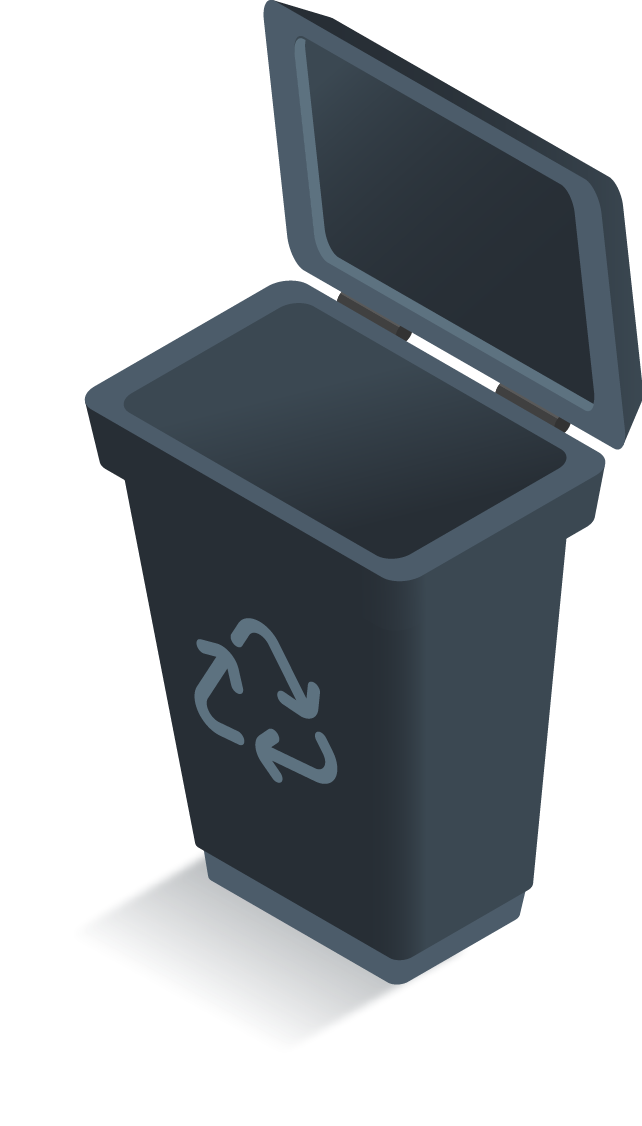
Local IT Outsourcing Solutions in South Africa
You can streamline your IT logistics and asset management with GroWrk’s comprehensive global solution. Whether it’s shipping equipment or managing IT assets across multiple regions, GroWrk helps you stay compliant and efficient, every step of the way. Here’s why GroWrk is the ideal partner for managing your IT assets in South Africa:

| 1. Wide global coverage |
With operations in over 150 countries, including South Africa, GroWrk ensures seamless IT equipment deployment for teams, no matter where they are. Our in-depth knowledge of South African regulations guarantees compliance and efficiency tailored to your business needs. |
| 2. End-to-end asset management |
From procurement to deployment, maintenance, and secure disposal, GroWrk manages the full lifecycle of IT assets. This allows businesses to focus on growth while ensuring smooth and secure IT operations. |
| 3. Intuitive platform for easy deployment |
Our centralized platform simplifies IT equipment management by enabling real-time tracking, shipment monitoring, and asset usage insights. This reduces administrative workload and enhances operational efficiency across South African offices. |
| 4. Smooth delivery and equipment retrieval |
GroWrk ensures the smooth delivery of IT equipment to employees throughout South Africa. We also manage the return of devices from departing employees, making the process cost-effective, streamlined, and hassle-free. |
| 5. Compliance with South African import regulations |
We handle all aspects of IT import compliance, including customs clearance, VAT, and electronic equipment regulations. By aligning with the South African Revenue Service (SARS) import requirements, GroWrk prevents delays and ensures a smooth supply chain. |
| 6. Efficient repairs and maintenance |
From routine servicing to urgent repairs, we coordinate IT equipment upkeep to minimize downtime. Our expert technicians ensure that devices remain in optimal working condition, allowing employees to stay productive. |
| 7. 24/7 Support for peace of mind |
Our dedicated IT asset management support team is available round-the-clock to assist with IT asset management, logistics, and troubleshooting. With GroWrk, businesses in South Africa can rely on expert support anytime. |
Procure, configure, and deploy your IT devices from one platform


